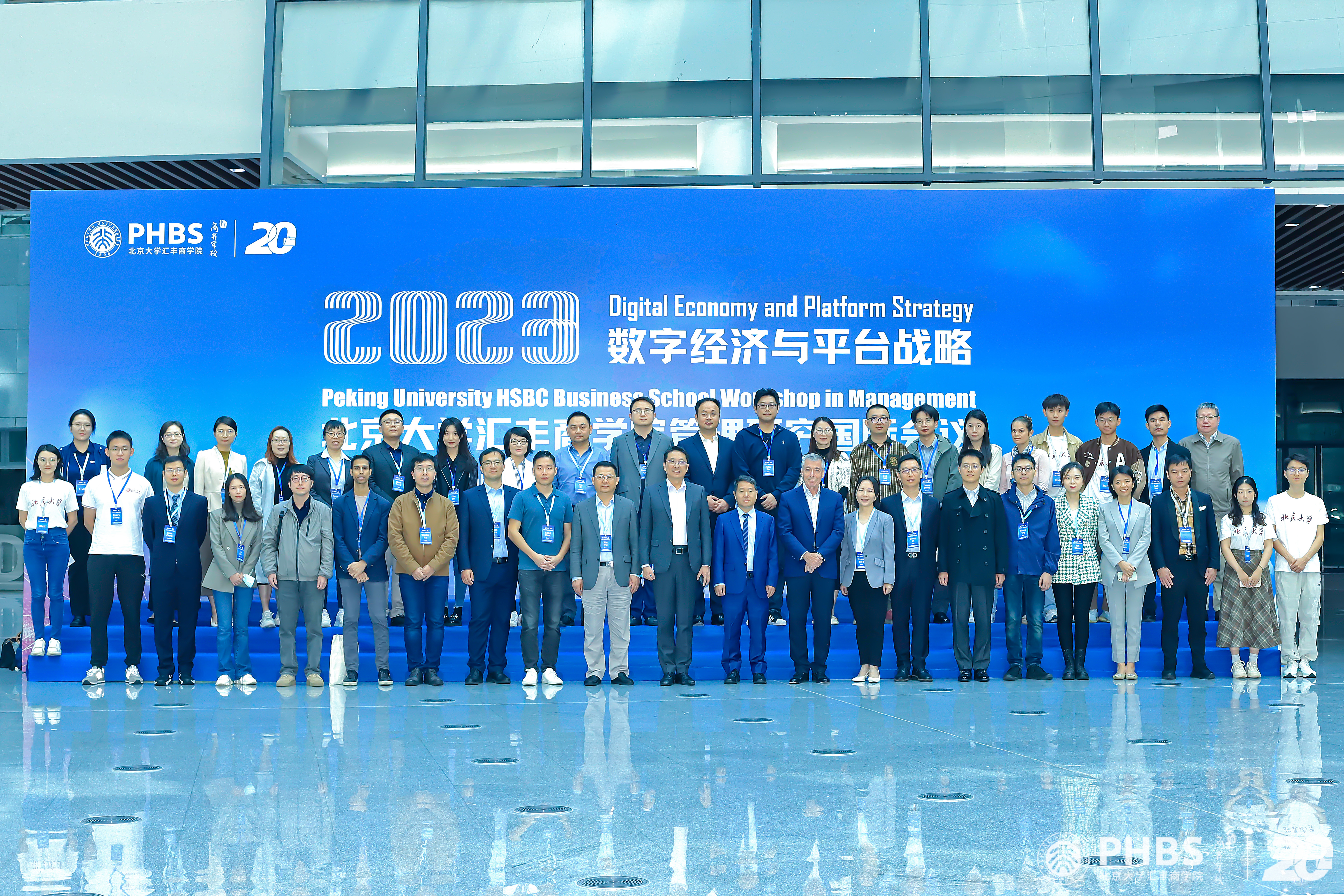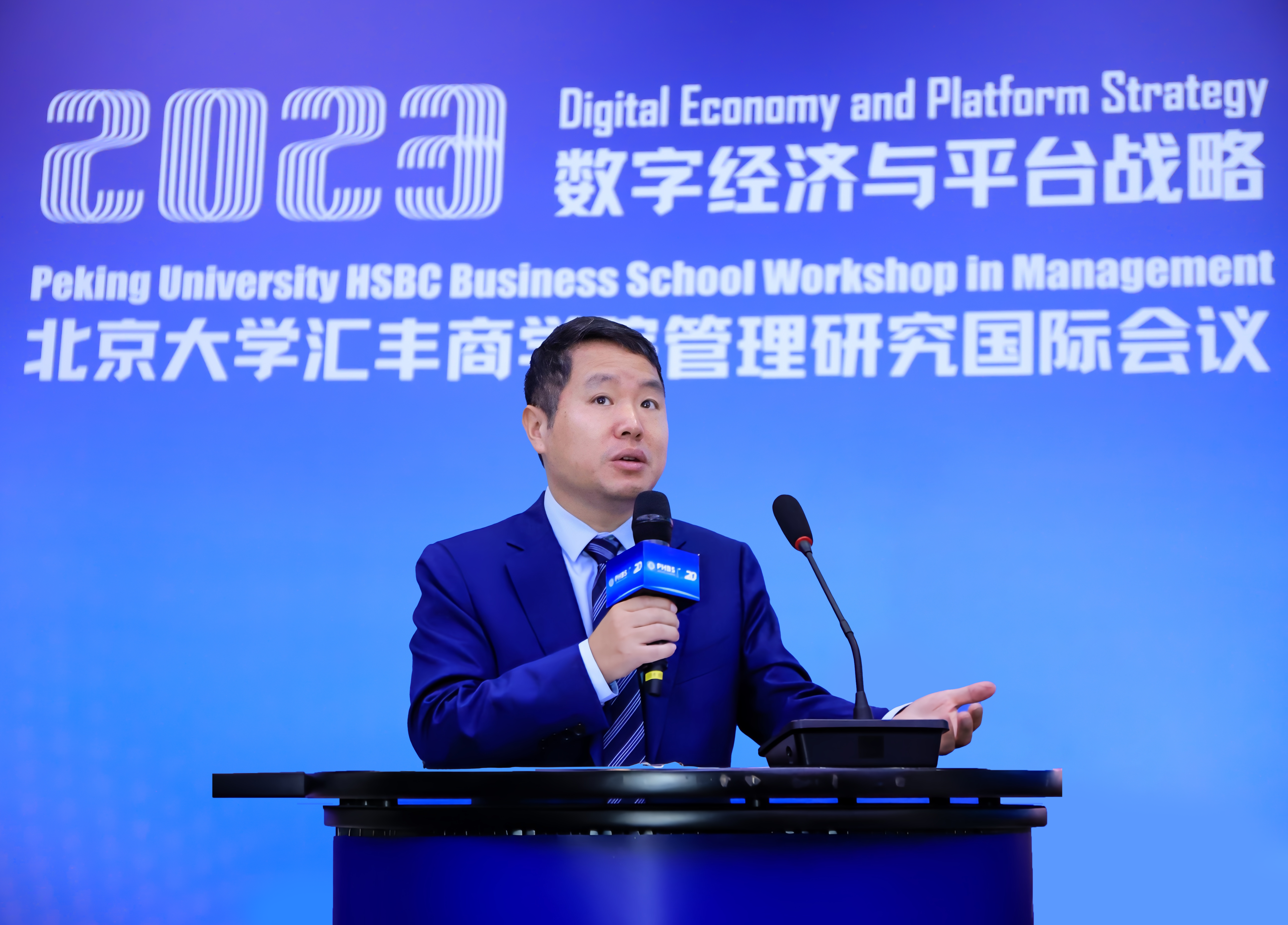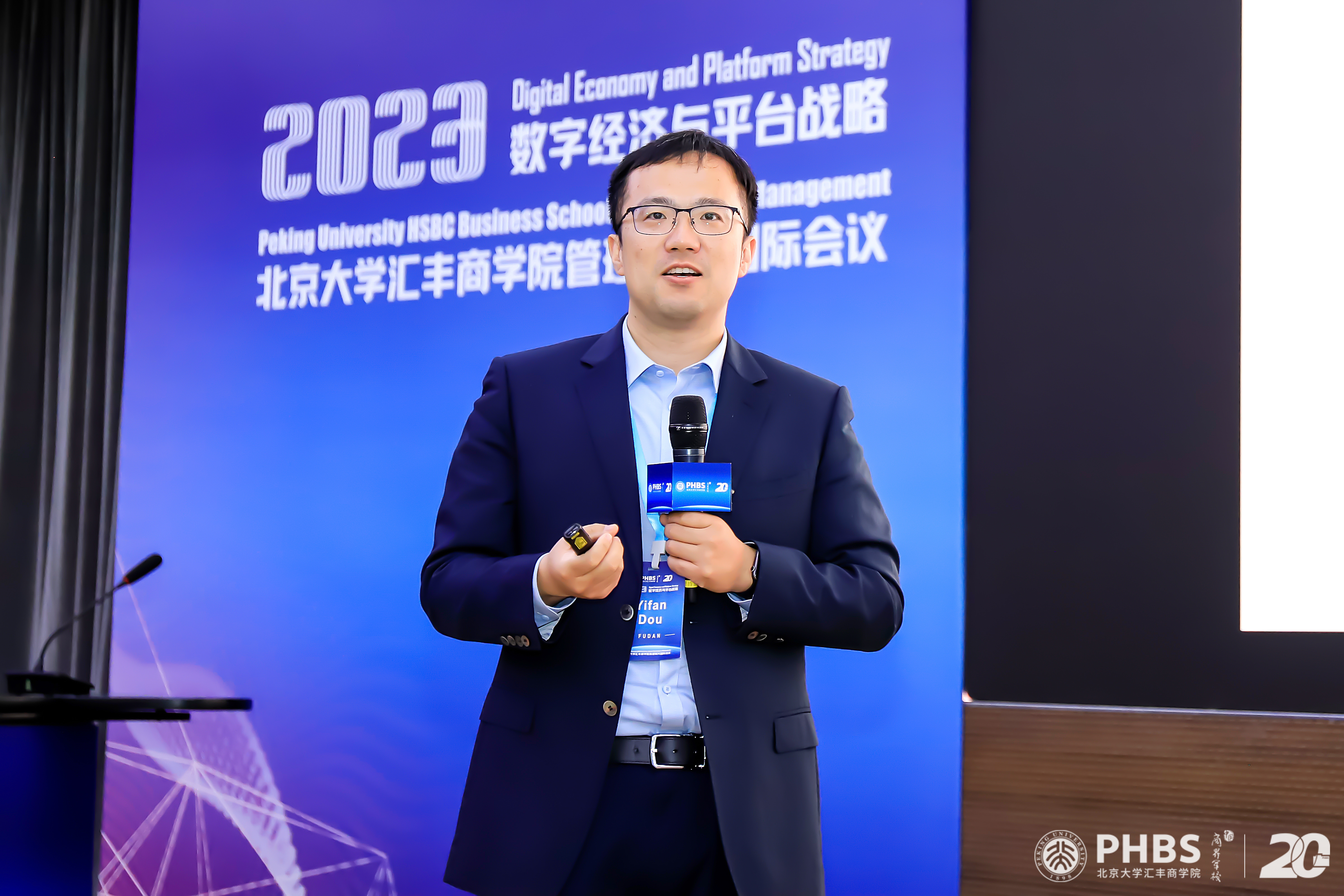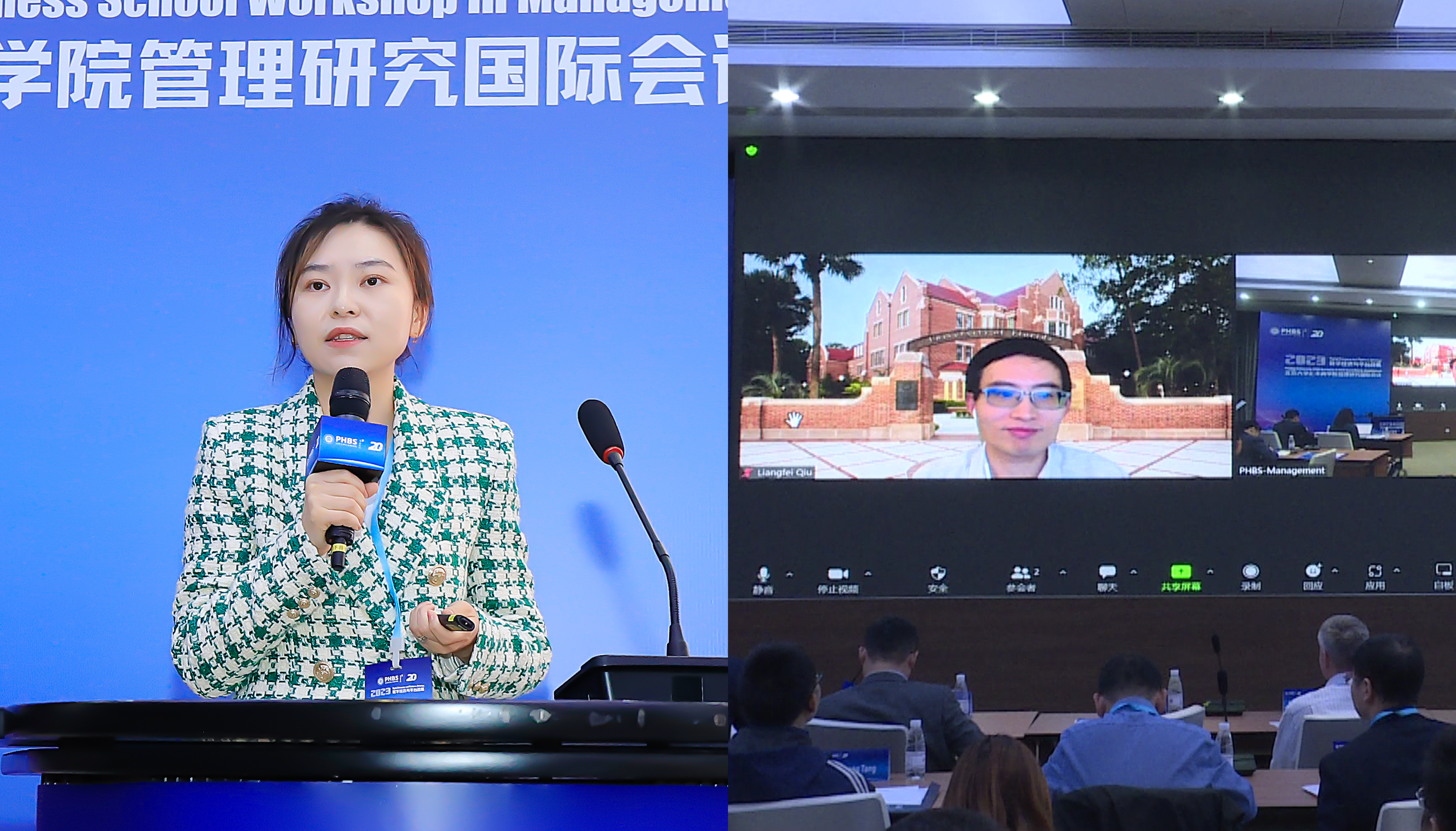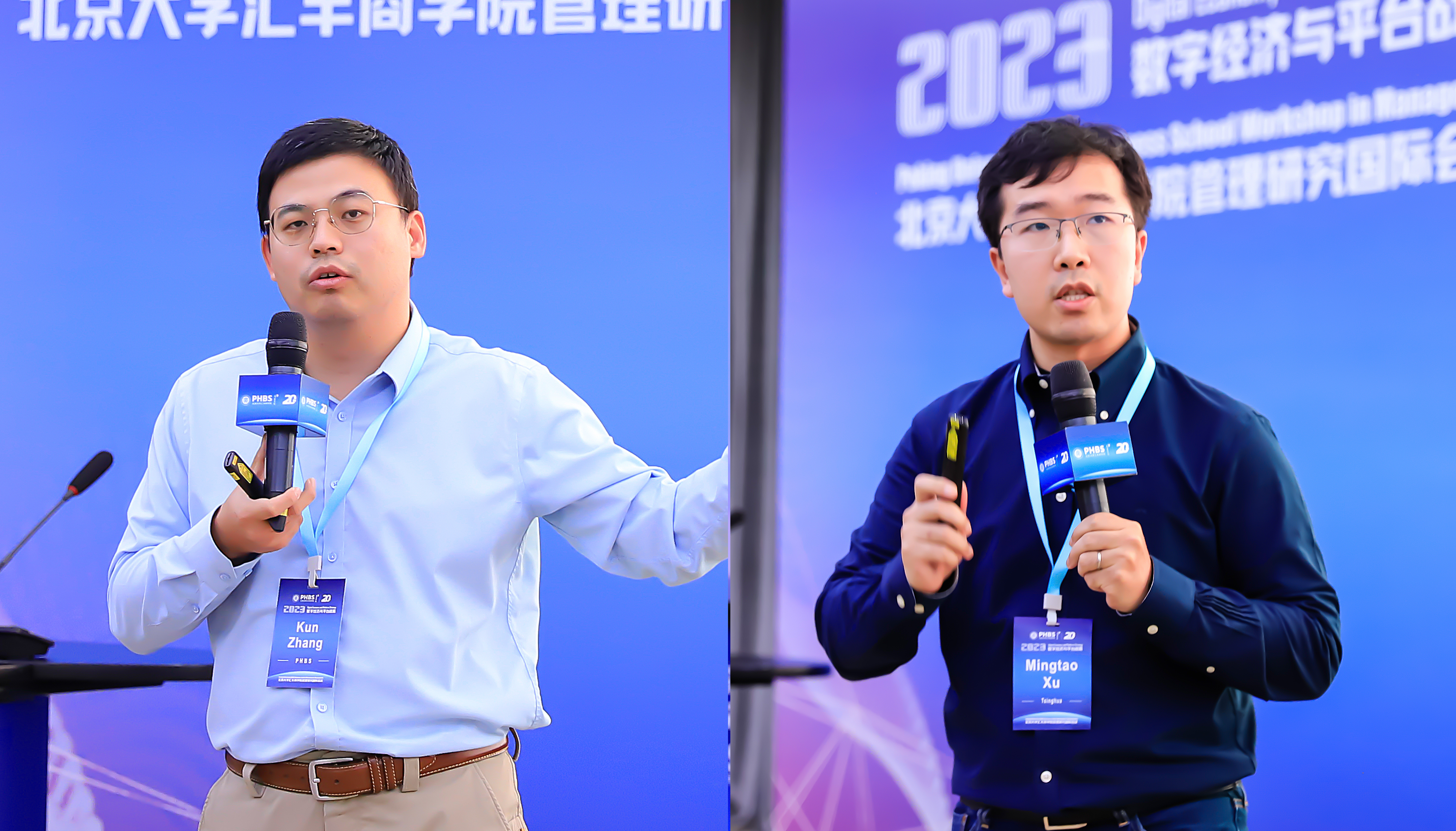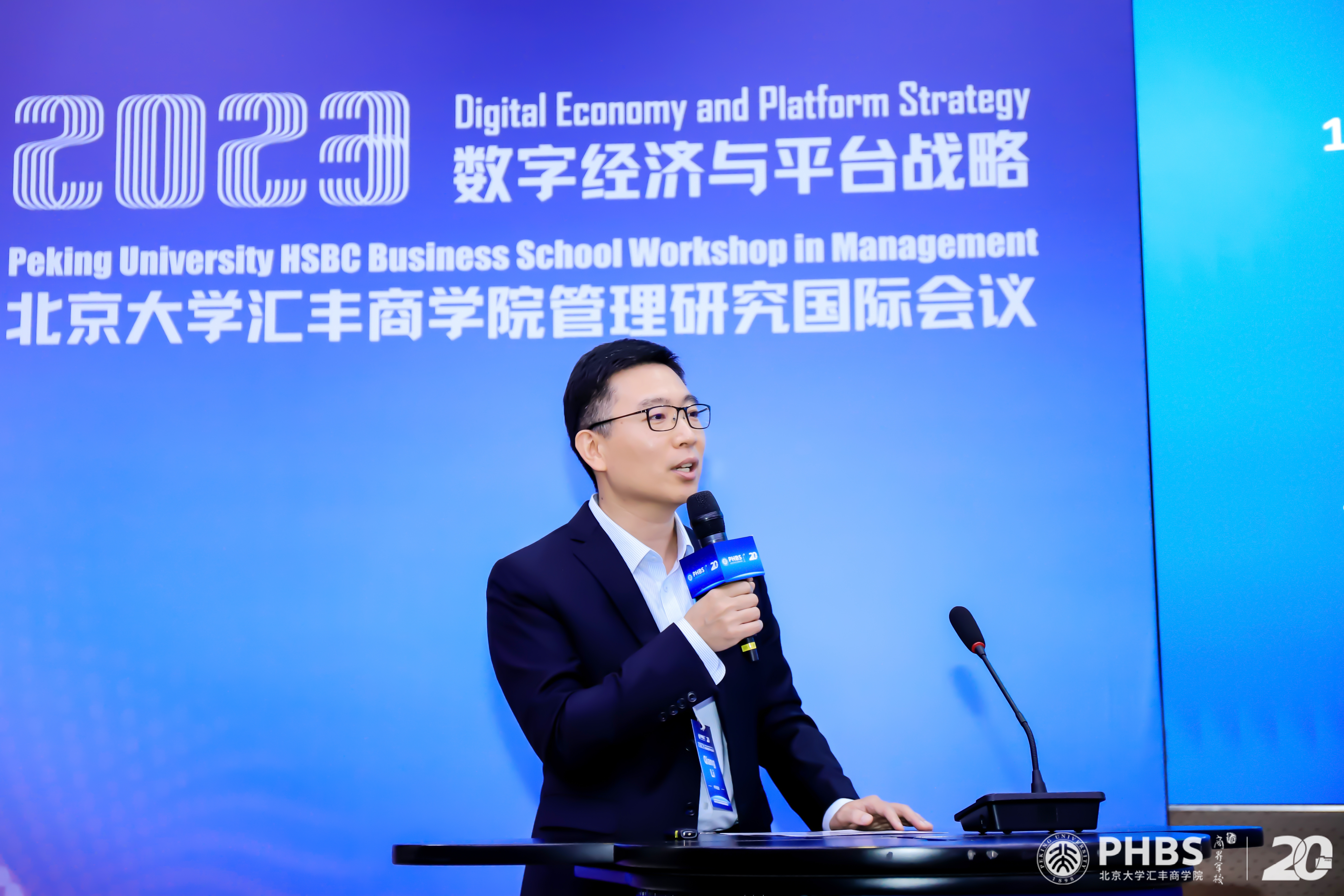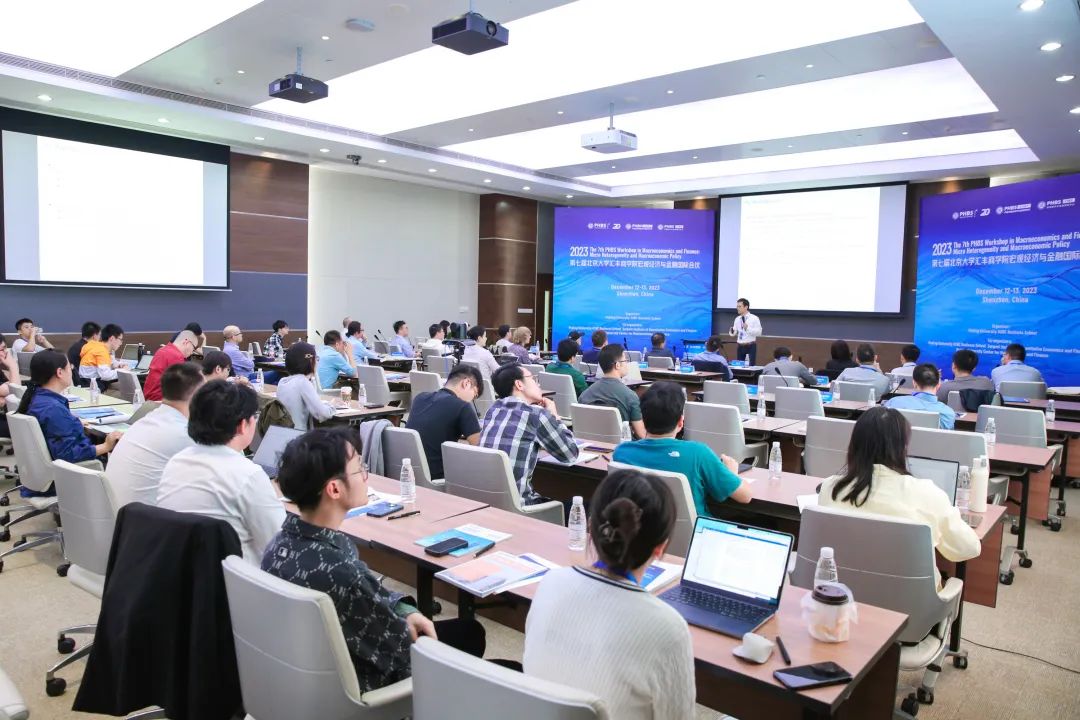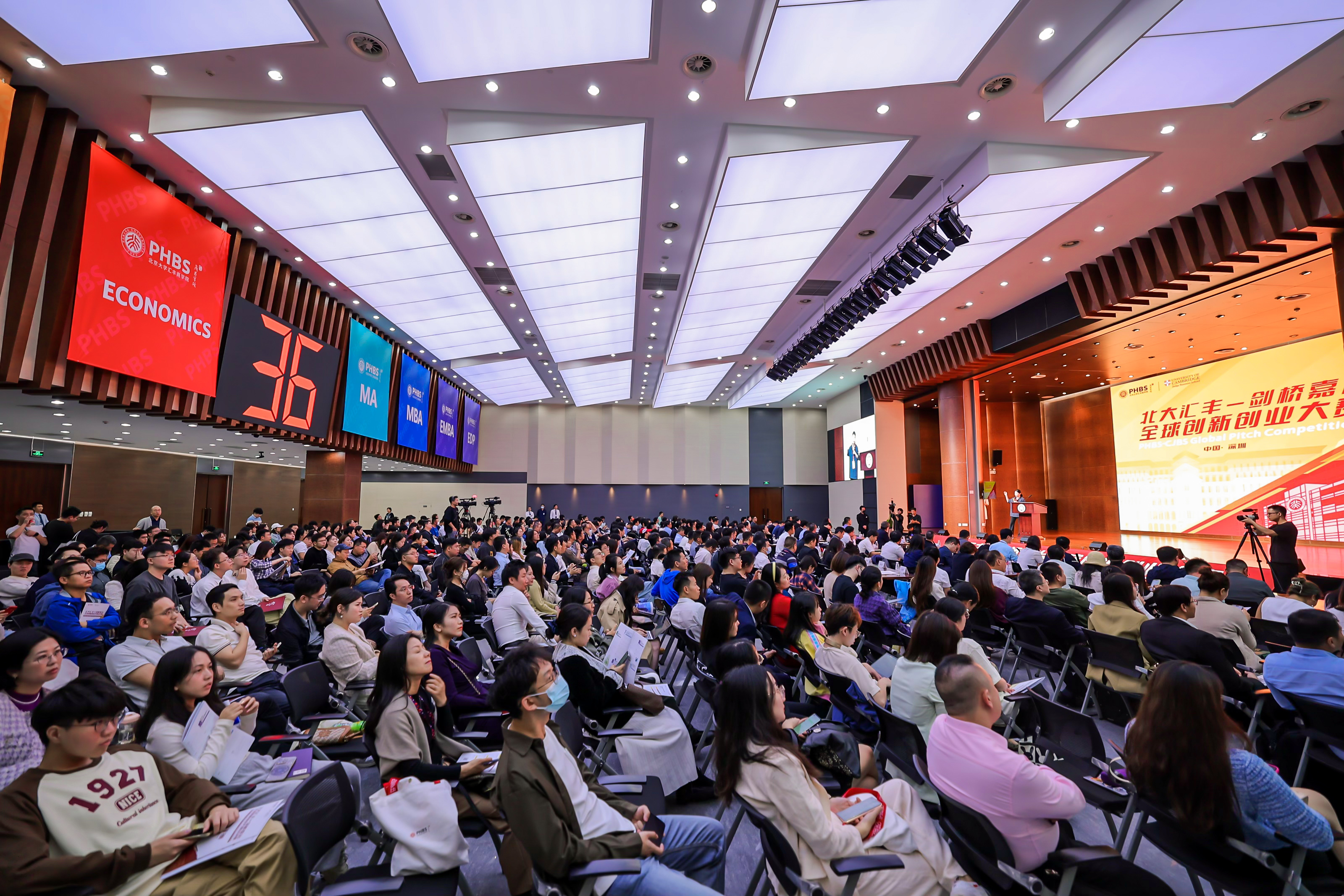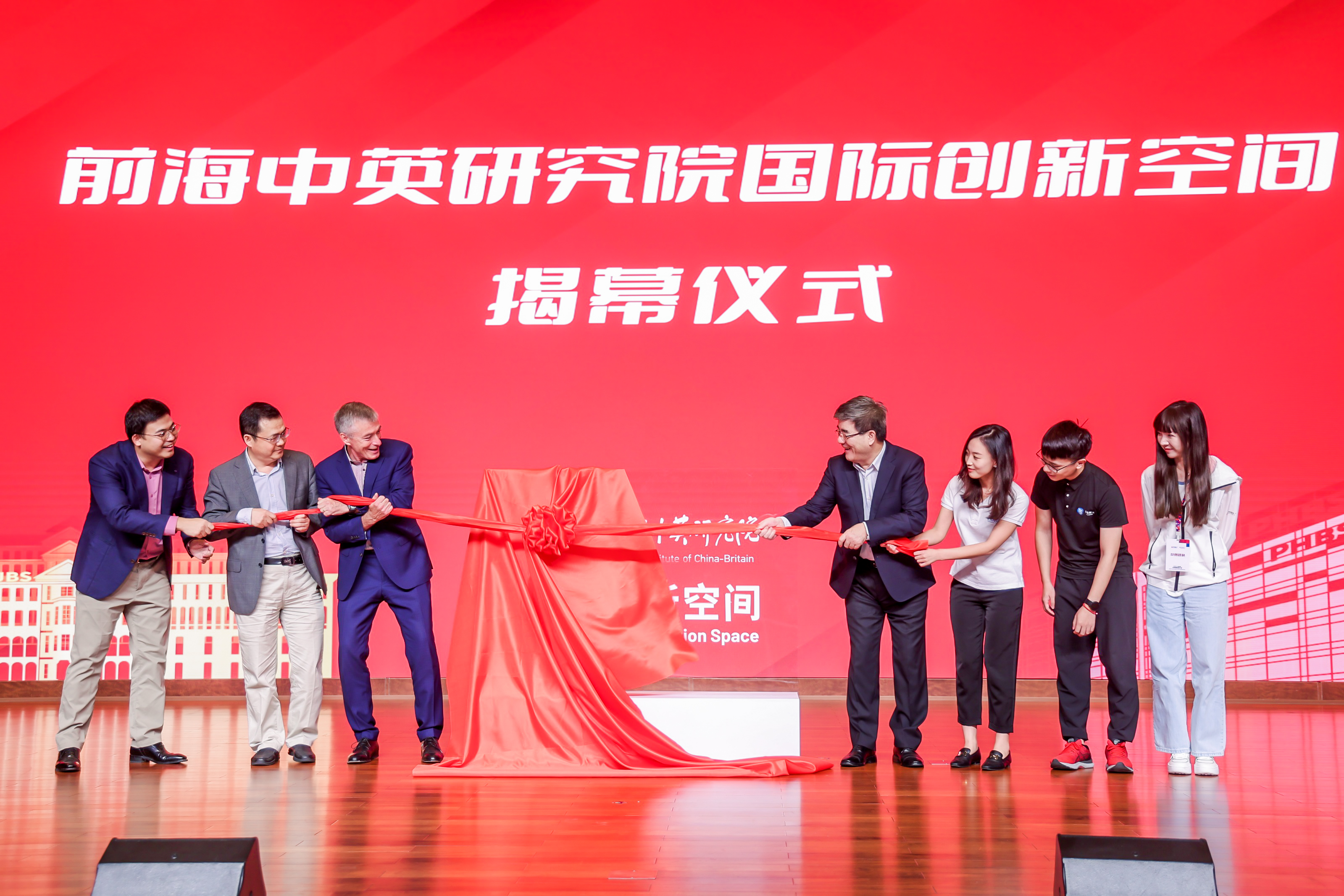The Peking University HSBC Business School (PHBS) held a landmark workshop in management on December 3, 2023, focusing on the burgeoning field of digital economy and platform strategy. As part of the school's 20th anniversary celebrations, this event provided a vibrant platform for more than 80 renowned experts and scholars from domestic and international institutions such as the University of Cambridge, the University of Toronto, the University of Florida, Virginia Tech, Singapore Management University, Tsinghua University, Shanghai Jiao Tong University, Peking University, Fudan University, Cheung Kong Graduate School of Business, Chinese University of Hong Kong (Shenzhen), Southern University of Science and Technology, Shenzhen University and Harbin Institute of Technology (Shenzhen).
The group photo of participants
Professor Wang Pengfei delivers the opening remarks
The opening remarks were delivered by Professor Wang Pengfei, chair professor of economics and dean of PHBS, who set the tone for the day's discussions. He recalled the faculty’s recent publications in the top-tier journals including
Management Science, Marketing Science, Information Systems Research, Manufacturing and Service Operations Management, Journal of International Business Studies, Journal of Operations Management, Production and Operations Management, and so on. He pointed out that the workshop would represent a significant moment in the school’s history, celebrating its 20 years of excellence and innovation in business education.
Professor Christoph H. Loch gives a keynote speech
In the evolving landscape of digital platforms, researchers need to adapt and embrace the changes, identifying novel ideas and opportunities in a dynamic and competitive environment. Christoph H. Loch, professor of management at PHBS and former dean of the Cambridge Judge Business School, delivered a keynote speech titled "Platforms as an Opportunity to do High Impact Research." He discussed the evolving landscape of platform research, which evolved from internal architectural platforms (which enabled modularity, mass customization and flexibility) to two-sided market platforms, which connected many previous unconnected suppliers and consumers. There is a thriving research area in platform business models and market design, which involves multiple disciplines (including Strategy, Marketing, Operations, Economics, and Computer Science), and which has had impact in indeed identifying new markets that have increased access to goods and services for new communities. A lot of this research now revolves around optimizing existing (perceived as stable) market structures. While this approach to research is a stable source of publications, it risks falling behind when the empirical phenomenon (platforms) is subject to strongly changing dynamics, which it currently indeed seems to be: the growing influence of emotional buying and the need for platforms to adapt to new competitive elements, including embracing B2B customers and other markets with very different customer and supplier characteristics. Research on such rapid competitive change requires capturing the entrepreneurial opportunities within evolving ecosystems. The keynote was concluded by stressing the importance for researchers to identify and comprehend innovative ideas emerging from companies' experimental activities.
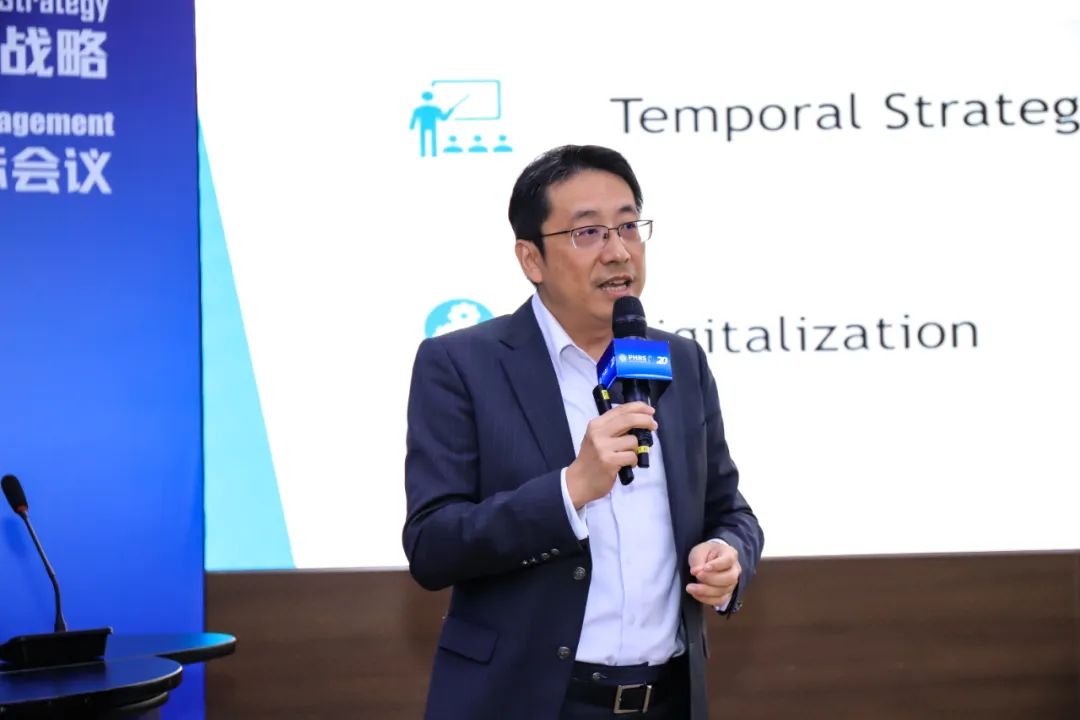
Professor Shi Weilei gives a keynote speech
Shi Weilei, professor of strategy at Cheung Kong Graduate School of Business, associate professor of
Journal of Management Study, delivered the keynote speech “Digitalization Strategy -Implication and Future Research Direction”. Professor Shi first discussed the consequences of digital strategies, emphasizing the need to bridge the gap between academic research and real-world effectiveness. Secondly, he elaborated on the antecedents of digital strategies, categorizing variables into CEO-level, company-level, and external environmental factors. Finally, he explored the implementation process of digital strategies, urging researchers to investigate different companies' approaches and the mechanisms driving the strategic process. Professor Shi concluded by highlighting the multidimensional nature of cultural values and the importance of considering environmental boundary conditions.
Professor Wei Wei delivers a keynote speech
Wei Wei, professor of management, vice chairman of PHBS Council, and director of Center for Innovation & Entrepreneurship at PHBS, delivered the keynote speech “How Business ExpertGPT Help Management Research.” He pointed out that while large models excel in accurately understanding various modalities of text, they also face challenges such as illusions, lack of real-time data traceability, inability to handle long texts, and uncontrollable output results. To address these issues, Professor Wei introduced a new system ExpertGPT, which combines deep large models, knowledge graphs, and small models to enhance the system's usability and effectiveness through technical architecture. Professor Wei outlined some application scenarios of the system, including intelligent information retrieval, specialized database generation, smart question answering, and intelligent table generation.
Dou Yifan gives a keynote speechDou
Dou Yifan, professor of Information Management and Business Intelligence at Fudan University, associate editor of
Information Systems Research, delivered the keynote speech “Leveraging Network Effects for Connected Products: Strategies and Implications for the Value Chain.” He discussed monetizing the emerging connectivity among physical products in a networked world. He and his co-authors explored two strategies: giving products away for free to expand the network and engineering network effects among products. Analytical models reveal that both strategies complement each other in a value chain setting. The change in the marginal production cost might result in a "connectivity revolution" in product innovation, which is in sharp contrast to traditional value chain research.
From left to right: Cheng Yue and Qiu Liangfei
Cheng Yue, assistant professor at PHBS, introduced her paper “Navigating Live-Streaming Commerce: A Tale of Two Strategies-Price Discounts and Short Videos.” Professor Cheng presented groundbreaking research on the live streaming broadcasting industry, shedding light on the effectiveness of two strategies: price discounts during live events and posting short videos before these events. More importantly, the findings suggest that combining both strategies may not yield optimal results, as the positive effects of price discounts can be attenuated by the posting of short videos. The study provided implications to the challenges faced by live streaming commerce, where attracting and maintaining viewer engagement is vital and valuable insights for streamers and brands navigating the competitive landscape of the live streaming industry. Qiu Liangfei, PricewaterhouseCoopers ISOM Professor at University of Florida, senior editor of Production and Operations Management, and associate editor of MIS Quarterly, discussed this paper. He pointed out that the paper discovered an intriguing inverse relationship between price discounts and real engagement, shedding light on the impactful role of short videos in enhancing viewer engagement.
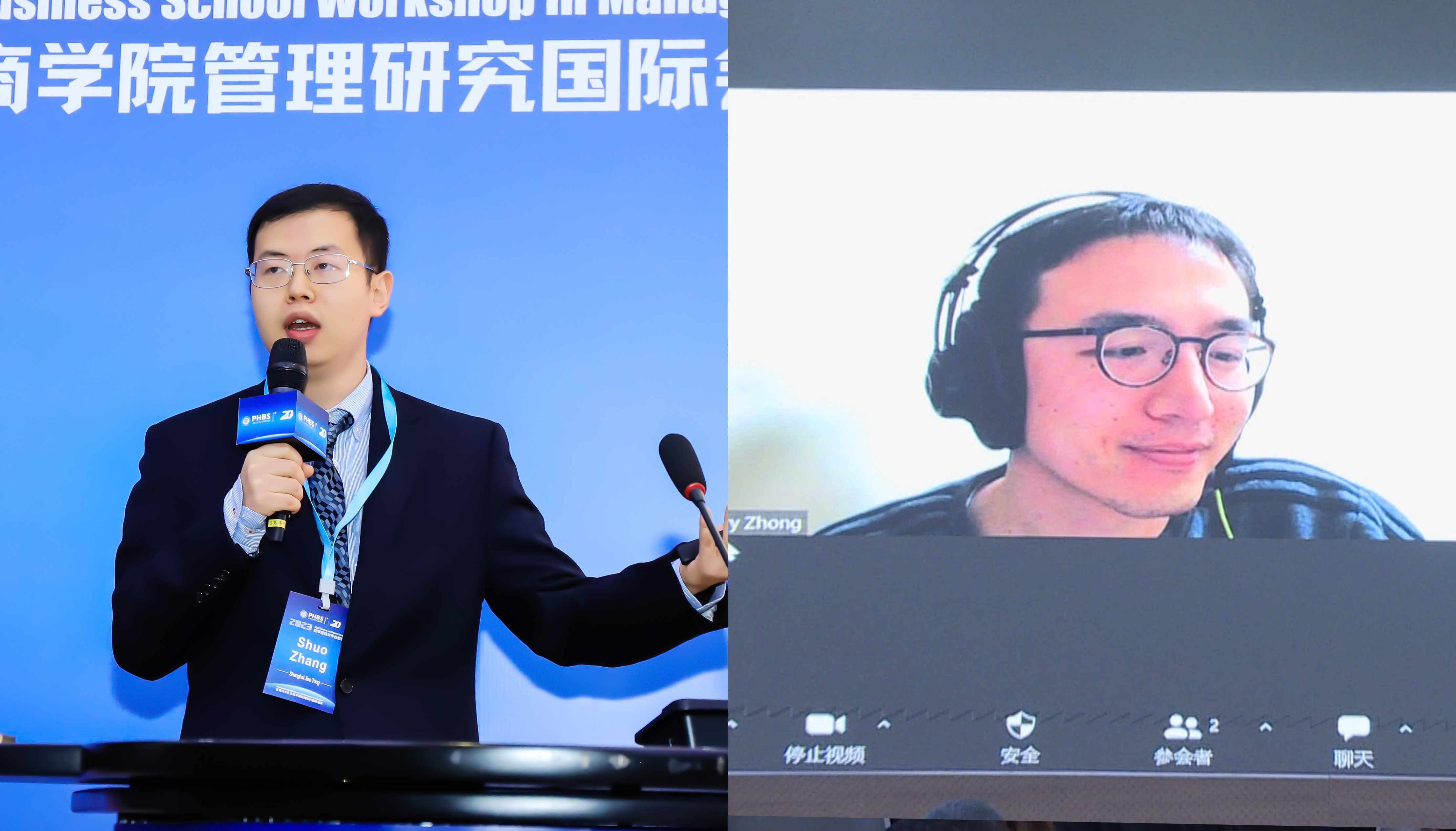
From left to right: Zhang Shuo and Zachary Zhong
Zhang Shuo, associate professor of Marketing at Shanghai Jiao Tong University introduced the collaborative paper “The Effect of Intellectual Protection Policies on Online Retail Platforms.” The motivation behind this investigation stemmed from the escalating issue of IP violations, particularly the rampant use of identical product images by different sellers. The research discovered that, contrary to common intuition, strict IP protection policies may actually reduce the sales revenue of legitimate copyright holders. This implies that the formulation of online IP protection policies is a complex process, and the most stringent IP protection measures may have unexpected consequences. The study aims to advocate for platforms and regulatory bodies to strike a better balance between protecting intellectual property and maintaining a healthy online marketplace. Zachary Zhong, assistant professor of Marketing at University of Toronto, pointed out that this research provides valuable insights for platform managers and policymakers in the digital commerce domain seeking effective solutions for protecting intellectual property (IP). He drew parallels between the findings and those in behavioral economics, indicating potential advertising effects behind the mechanisms, and discussed the importance of online "shelf space". He further discussed sellers' responses to intellectual property policies and subsequent strategies.

From left to right: Ehsan Bolandifar and Zhao Wenhui
Ehsan Bolandifar,associate professor at PHBS, introduced the paper “Unmasked: The Paradox of Budget Transparency in Entrepreneurial Ventures. “ He discussed the impact of budget disclosure in crowdfunding campaigns focusing on Kickstarter and highlighted that despite Kickstarter's push for transparency, disclosing budget details negatively affects funding outcomes for entrepreneurial ventures. The study investigates various aspects, including the characteristics of entrepreneurs willing to disclose budgets, the influence of disclosure on customer behavior, and the effect on operational performance. The findings have suggested that budget disclosure leads to reduced funding, especially for low-risk and less innovative projects. However, it positively affected operational performance by reducing project delivery delays. Zhao Wenhui, professor of Operations Management at Shanghai Jiao Tong University discussed the paper. He explored two potential reasons for the difference in risk perception between new and existing ventures:Firstly, the equilibrium might not have been reached yet, requiring more time for supporters to understand the risk profile fully. Secondly, competition dynamics and disclosure policy variations contributed to this difference. He proposed exploring whether higher-quality disclosure leads to larger financing amounts.
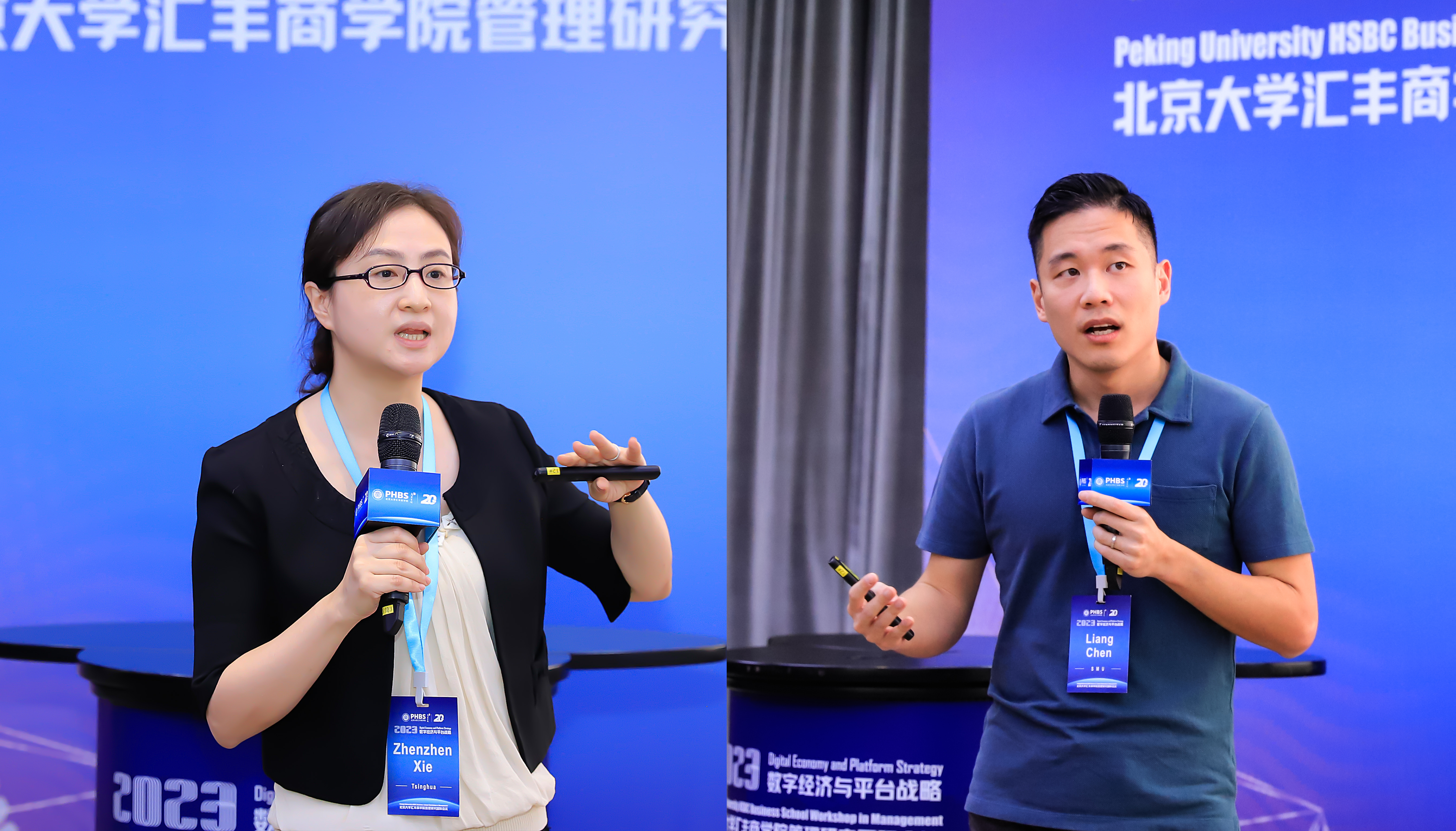
From left to right : Xie Zhenzhe and Chen Liang
Xie Zhenzhen , associate professor at Tsinghua university, introduced the paper “Rifts on Digital Platform: the Heterogeneous Impact of Revenue Sharing Policies Change on Global Gaming Market Hierarchies," which explored the role of platform governance, design, and orchestration in influencing the performance of platform complements. By probing the impact of changes in revenue-sharing mechanism on the revenue of games and the relationship between platform owners, game developers, and users, the study suggested that the shift in the revenue-sharing mechanism has led to income disparity among platform complements, favoring games developed and published by elite publishers. Chen Liang, senior editor of Management and Organization Review, associate professor of Strategy & Entrepreneurship at Singapore Management University, discussed this paper. He mentioned that the study touched on platform governance theories and competition management, emphasizing the need for further exploration of underlying mechanisms and the ongoing dynamics between platform owners, complementors due to revenue-sharing policy change.

From left to right: Tang Chuang and Ni Jian
Tang Chuang, assistant professor at PHBS, introduced the paper “Fighting for My Idols: The Value of Gamified Voting System." He explored the impact of a new feature, a gamified voting system, on user engagement in an online social media platform. Collaborating with industry partners, the study found that the system increases user activity, especially for active users and fans of celebrities. Additionally, the system showed spillover effects, influencing user behavior outside the community where the feature is not implemented. The study suggested that gamified elements could effectively enhance user engagement and provides insights for personalized interventions to cater to different user segments. Ni Jian, professor of Marketing at Virginia Tech highlighted the significance of the study's main findings, emphasizing the increase in user activity among active and devoted users, and suggested exploring the incentive structure for users.
From left to right: Zhang Kun and Xu Mingtao
Zhang Kun , assistant professor at PHBS, introduced the paper “Business ExpertGPT for Management Research: A Conceptual Framework and an Explorative Study.” He discussed the integration of AI, specifically Expert GPT, into management research processes. The study emphasized how AI, through tasks like data analysis, literature review, and problem identification, can complement and enhance human capabilities. Professor Zhang explored the potential for AI to reshape the traditional research methodology, focusing on how AI assistance can contribute to generating novel ideas, refining research questions, and optimizing the overall research process. He also acknowledged challenges such as AI ethics and emphasizes the need for researchers to adapt to new capabilities offered by AI. Xu Mingtao, assistant professor at Tsinghua University, raised questions about the collaboration between humans and AI, trust in AI, AI's impact on competitive advantages, and the role of AI in shaping confidence in research. He emphasized the need for researchers to adapt to AI capabilities while acknowledging challenges like AI ethics.

Zeng Xiaohua, associate professor at PHBS, delivers the closing remarks
On behalf of other members of the organizing committee (Tang Yinuo, Zhou Deming, Li Qiang, and Ehsan Bolandifar), Professor Zeng Xiaohua expressed her gratitude to the workshop speakers, participants, and volunteers for their contributions. She highlighted the diversity of topics discussed and the valuable interactions among attendees and mentioned plans for future workshops with continued support from the academic community.
Li Qiang, associate professor at PHBS, presided over this workshop
This workshop highlighted PHBS’s tradition of promoting high-level academic and practical discussions, emphasized the school's commitment to making significant contributions to the field of management, and provided unique insights into the current trends and future directions in this field.
By Sun Bo
Edited by Zeng Xiaohua and Annie Jin
Source: PHBS PR and Media Office





